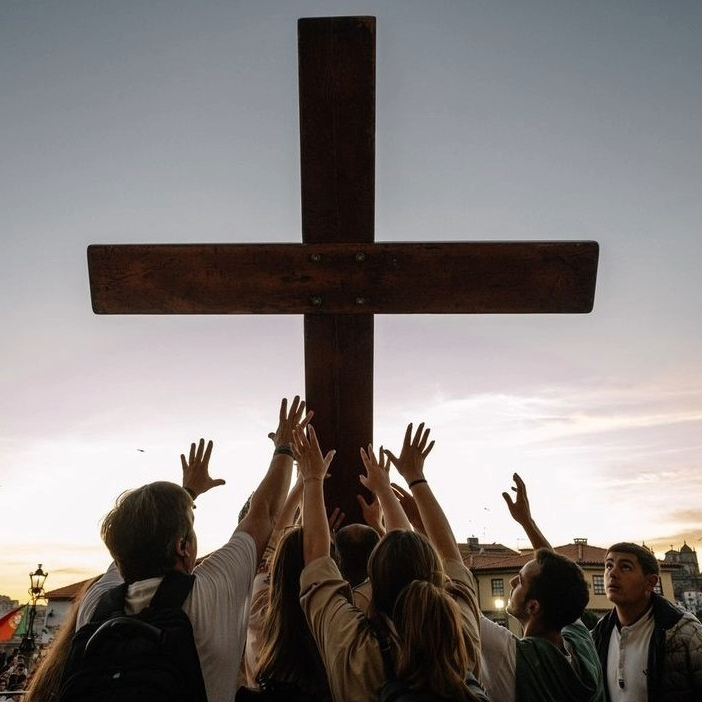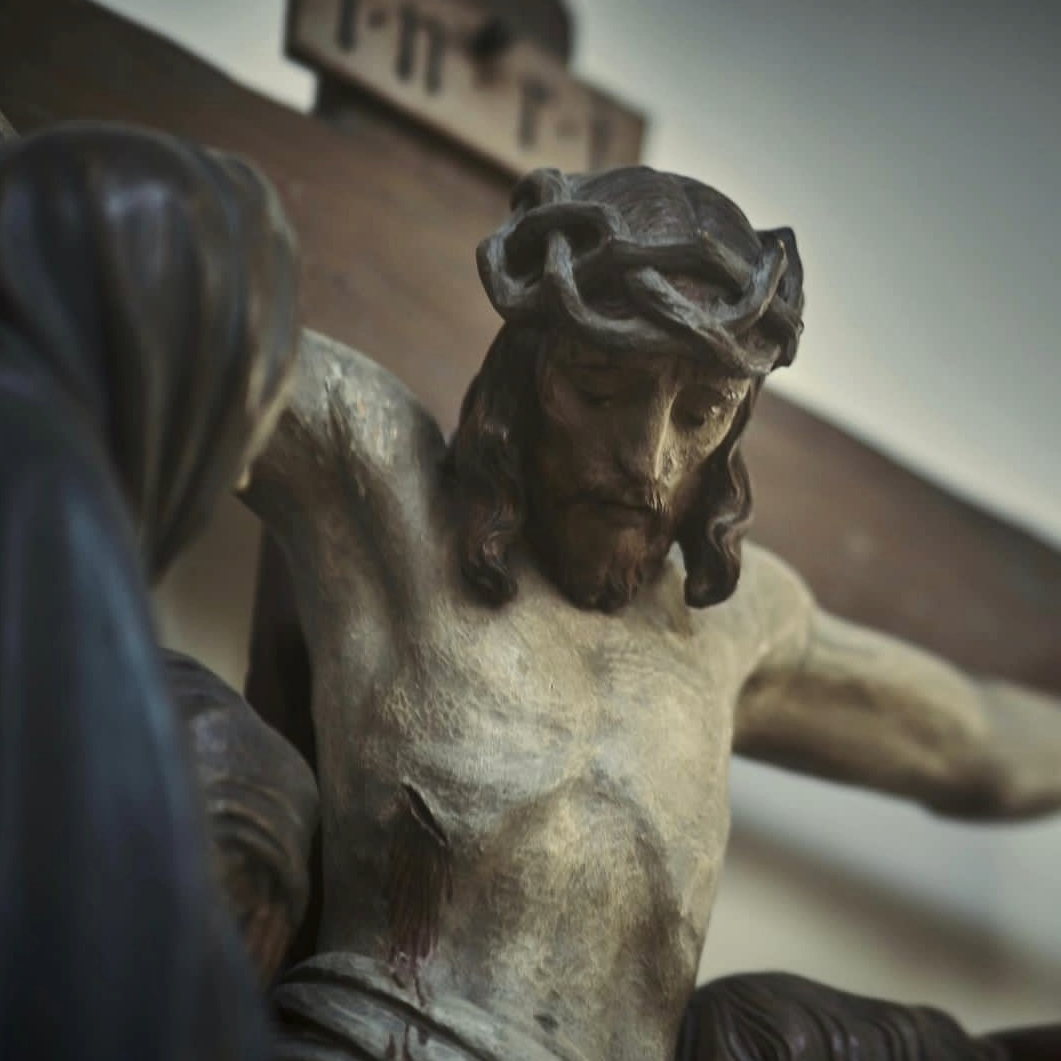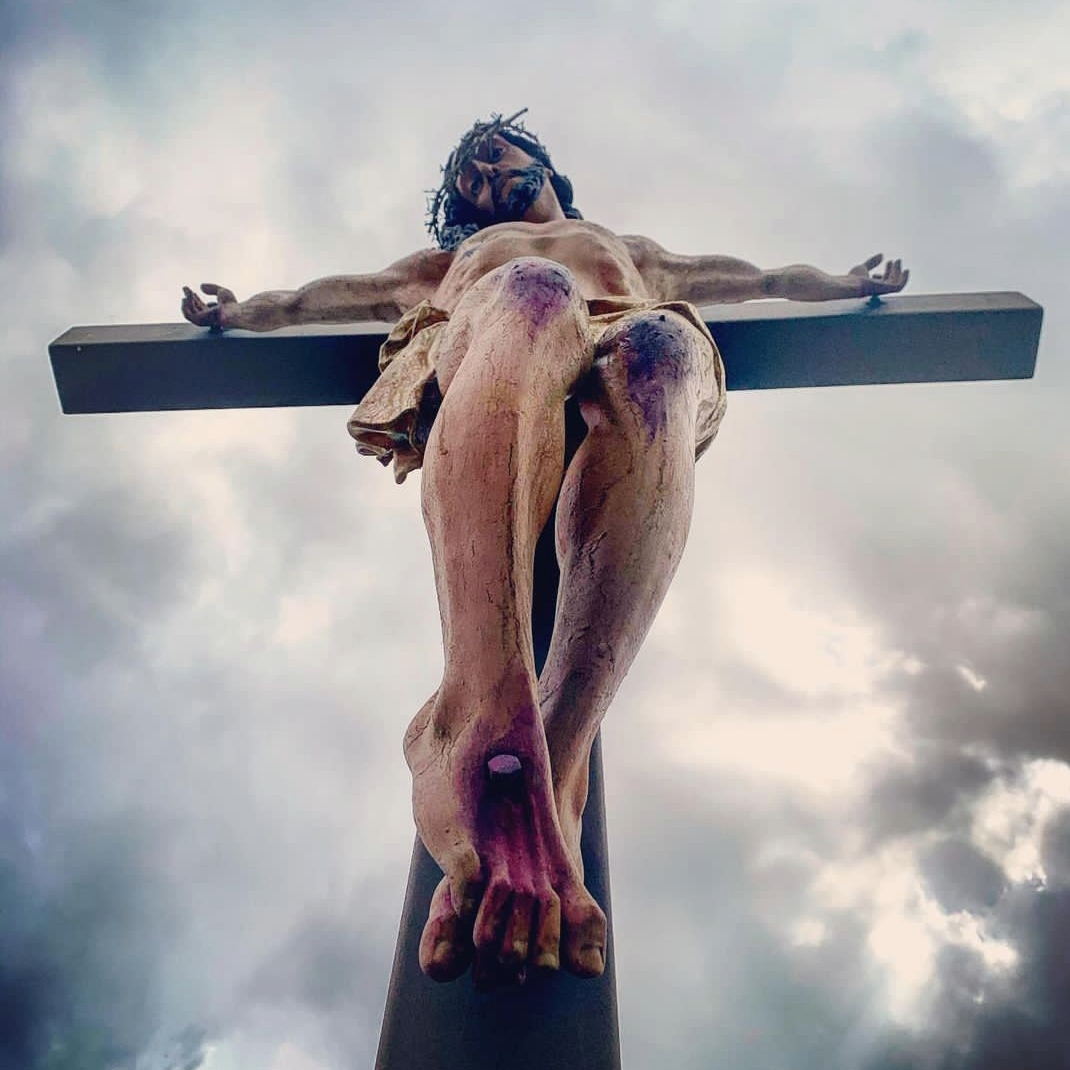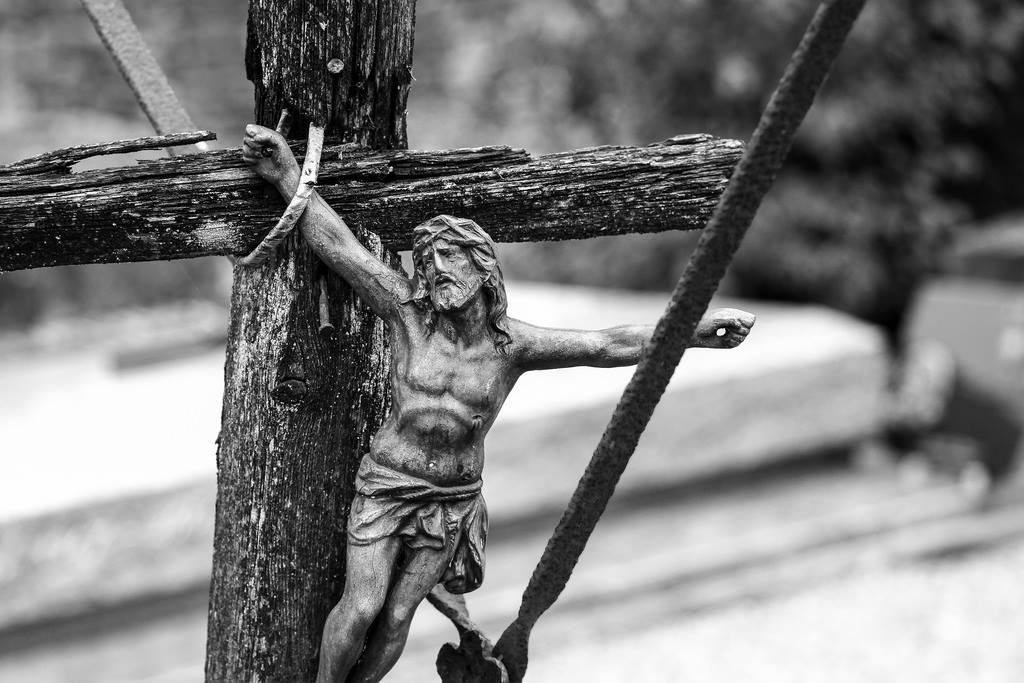
It is believed that mother Mary who accompanied Jesus on his way of the cross who is the model and source of this devotion (Way of the Cross). As we continue this Lenten journey let us follow the footsteps of Jesus along with Mother Mary. In the first station, we see Jesus is condemned to death and in the second station; He begins his redemptive journey by carrying His cross. There is a question that creates a lot of dilemma in us: Why did God choose this way of the cross for His beloved Son? We cannot state a definite answer for this. But If God would have chosen some other means for the salvation of humankind, then the greatest tragedy of humankind, ‘the problem of suffering’ could have left unanswered.
Jesus was condemned unjustly. All the crimes charged against Him were part of the conspiracy against him. All through the public ministry we evidently witness how He faces the allegations of Jewish religious leaders with convincing and prudent answers but at this juncture, Jesus accepts those entire allegations just like the Paschal lamb. Isaiah in his prophecy about the suffering Servant of Yahweh says: “He was oppressed, and he was afflicted, yet he did not open his mouth; like a lamb that is led to the slaughter, and like a sheep that before its shearers is silent so he did not open his mouth” (Is. 53: 7). God is always with us, even in those moments we think that we are left alone, abandoned by all; He is there on our side as an intimate companion who helps us to carry our daily cross. Let us remember and pray for all those unjustly condemned and those who struggle to meet the challenges of their day-to-day life that they may encounter Jesus as the one who walks by their side. Let us encourage each other to continue our way in hope…
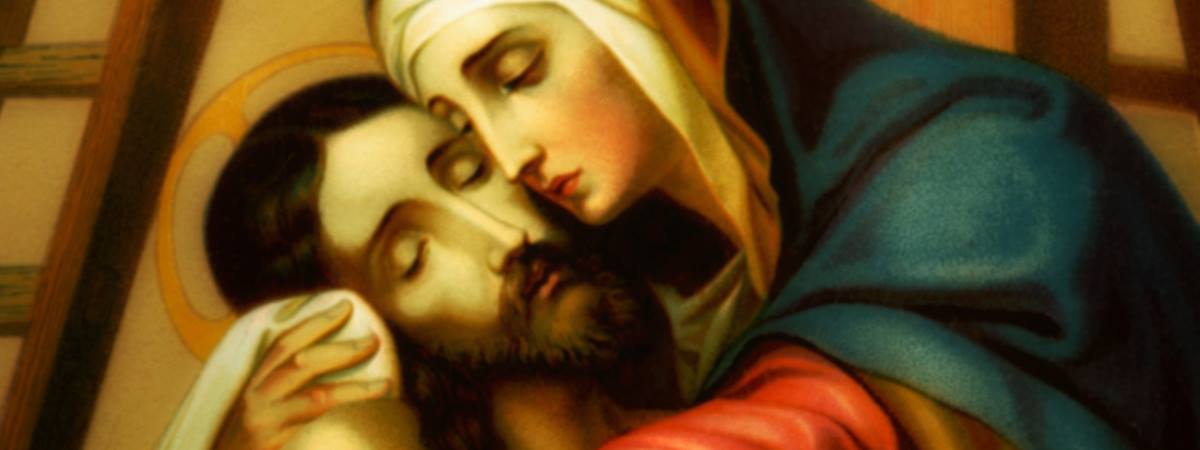
A Disciple is one who is called to walk the way of the Master; even at the cost of all his/her possession and his/her own life. As we follow our Master Jesus in his footsteps let us contemplate on the 3rd and 4th stations of His way. We all have experienced varied falls in our life spiritual, physical, intellectual etc. Spiritual fall happens when we distance ourselves from the Master and decide to walk our own way. We experience Physical fall when our body become weak whereas, when our prejudices blind the intellect completely we have the third category of fall. But, In the case of Jesus, He did not have any form of above mentioned failures yet. He decided to fall for you and me that we may be able to get up by experiencing the rhythms of grace. Fallen men and women will rise again on wings of grace, out of his meritorious passion and suffering…
The 4th station invites us to reflect on the beautiful love story of the whole of the Bible. A Son who fell in love with his mother from eternity and a mother who dedicated her life for her beloved son. She continues to partake in his mission by drawing all people to Christ. In the midst of physical and mental suffering the meeting with his mother comforts Him. All his disciples who were called to be with him abandoned him but this perfect disciple stand by His side. He realizes that he is not alone but she is there… like a shadow, in his sojourn from crib to the Calvary. Then again, who would give to humanity as his parting gift other than His own Mother… Mary, the woman never fails…
Dear friends all of us experience fragilities on our way but it is not a reason to give up. When we fall, let us seek His amazing grace and ask his amazing mother to hold our hand…we will not fail, we will be strengthened to carry our cross and continue our way…

“He will not fail you or forsake you.” Deut. 31:6
The fifth and sixth station of the way of the cross can be considered as stations of tender love and care. It is a significant moment wherein the universal saviour was assisted and helped by the human beings. Simon of Cyrene was asked to carry the cross. If the merciless Roman soldiers decided to appoint someone to help Jesus to carry his cross means the condition of Jesus could have been so miserable. Simon felt compassion for Jesus, he might have not understood the notion of a suffering Messiah and above all the divine identity of one he is helping, that he is the Son of God. He is blessed among men because he had the unique privilege of carrying the cross and helping out Jesus in his most agonizing and helpless moment. The lesson of the way of the cross is that people whom we think would be there for us, may not be there when we need them the most. At the same time unknown people whom we may not have even seen will be the only ones available to carry our burden.
The 6th station portrays the heroism of Veronica. None of the gospels recorded the event but even today Veronica and her towel on which was imprinted the face of Jesus remain as a great legacy. We need to assume that Veronica was not a stranger to Jesus. She could have been part of the close disciples of Jesus. Otherwise she would not have performed such an act of charity during the execution of a criminal by the Romans. At that moment Jesus did not have anything to give back to her for her gesture of immense love. But, He gives his own image to her. All through his public ministry Christ cared for and healed the vulnerable. At this moment of his vulnerability, Veronica becomes another Christ by living out his values. “I was a prisoner, I was thirsty…” Simon of Cyrene and Veronica present before us as the paragon of Christian discipleship and charity. Let us continue to help our brethren to carry their crosses by being with them in their way of the cross…
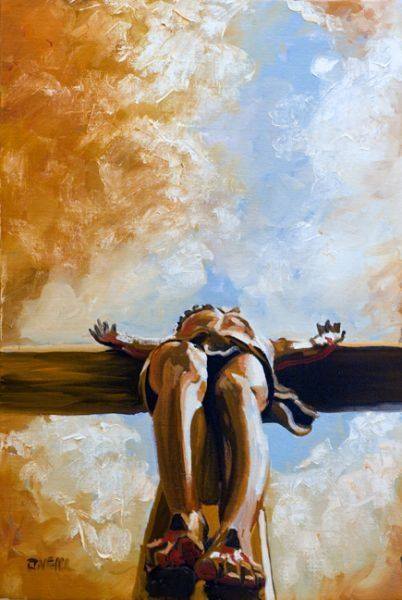
Today let us contemplate on the 7th and 8th stations of the Way of the Cross. In the seventh station we see Jesus falling for the second time. What is this second fall of Jesus conveying to us? The falls are part and parcel of our earthly sojourn. No one can claim that they haven’t had a single fall. After very fall, normally we examine the reason that led us to fall.
In the seventh station we see Jesus falling for the second time. What is this second fall of Jesus conveying to us? The falls are part and parcel of our earthly sojourn. No one can claim that they haven’t had a single fall. After very fall, normally we examine the reason that led us to fall.
Jesus carried the burden of our sins. When we distance ourselves from God with our sinful life, there is a strong possibility for a fall, either spiritual or physical. These falls in a way help us to be humble ourselves, because in those moments we recognize that we are in need of God’s grace than our own physical and mental strength to get up and continue our journey. Jesus was too weak and unable to get up; yet he gets up and continues his journey, impelled by the purpose of his journey. This is a clear sign of the need to depend on God’s Strength and grace to complete our journey. My grace is sufficient for you (2Cor. 12.9). I can do all things in Him who strengthens me (Phil 4.13).
The 6th station portrays the heroism of Veronica. None of the gospels recorded the event but even today Veronica and her towel on which was imprinted the face of Jesus remain as a great legacy. We need to assume that Veronica was not a stranger to Jesus. She could have been part of the close disciples of Jesus. Otherwise she would not have performed such an act of charity during the execution of a criminal by the Romans. At that moment Jesus did not have anything to give back to her for her gesture of immense love. But, He gives his own image to her. All through his public ministry Christ cared for and healed the vulnerable. At this moment of his vulnerability, Veronica becomes another Christ by living out his values. “I was a prisoner, I was thirsty…” Simon of Cyrene and Veronica present before us as the paragon of Christian discipleship and charity. Let us continue to help our brethren to carry their crosses by being with them in their way of the cross…
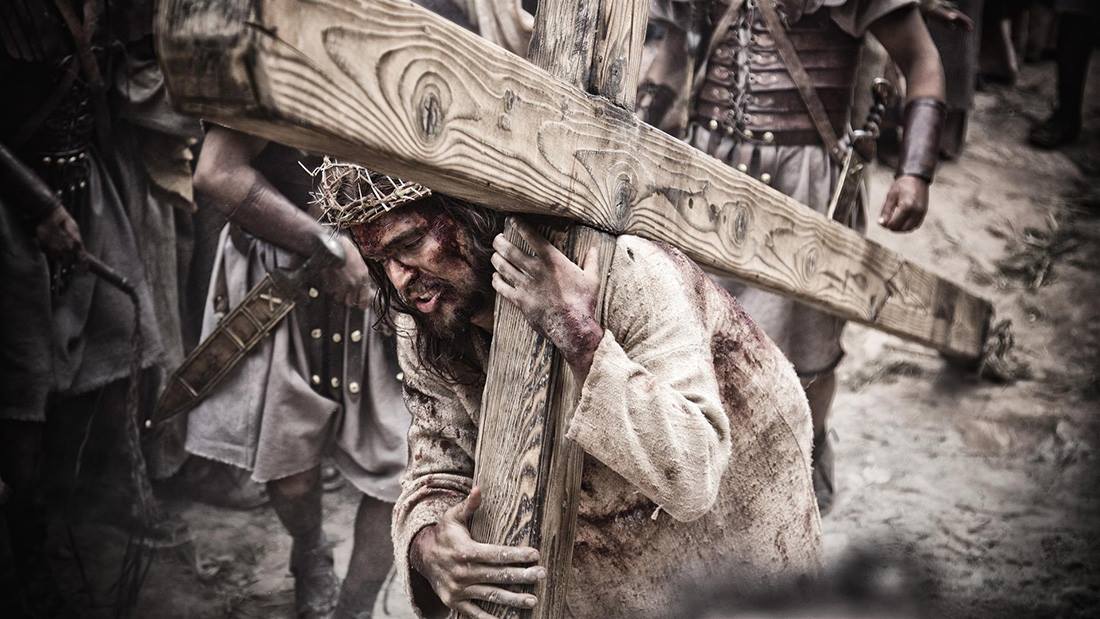
Today let us contemplate on the 9th and 10th stations. In the 9th station we see Jesus falling for the third time. This is the only event which is repeated thrice in the way of the cross. According to the biblical literature the number three has a profound symbolism. It is considered as a perfect number. The third fall of Jesus tell us that He became the perfect symbol of the fallen humanity. The Son of God identified himself completely with the failures of humankind. As his name indicates, He is with us even in our sinfulness and failures as our redeemer. He did not sin but he carried the burdens of our shortcomings. When we sin, we move away from the grace and gradually we fall. Though, He was the Son of God, yet He has to face the consequences of our sins and He falls thrice. But He did not give up. By getting up from his falls, He gave us hope that however deep our falls, He can redeem us. The psalmist praises God: “Our steps are made firm by the Lord, When He delights in our way; though we stumble, we shall not fall headlong, for the Lord holds us by the hand” (Ps. 37: 23-24).
In the 10th station, we see Jesus is stripped of his clothes. Cloth is something that covers our nakedness and give us dignity. Romans usually strip off the clothes of those who are condemned for the crucifixion. So that they may die in utter shame. Even the basic human respect and dignity were denied them. In the book of Genesis we see that when Adam and Eve commits sin, they became aware of their nakedness and they tried to hide themselves from the presence of the Lord. But, Jesus was not ashamed. He offered His sacrifice to the Father remaining naked that never again we may feel ashamed in the presence of the Lord; thus, His nakedness covers our guilt and shame. That might be the reason people belonging to any walk of life don’t feel shame when they look upto the crucified Jesus. “Look to Him and be radiant; so your faces shall never be ashamed.” (Ps. 34:5) Finally, he gave His seamless tunic, the tunic of divine innocence and grace…a tunic that is always made available to cover our spiritual nakedness… When our sinfulness and failures fill our being with guilt and shame, let us not forget to look up to the crucifix – that man on the cross who became the symbol of guilt and shame that we will be empowered to conquer our guilt and shame and walk with God again…
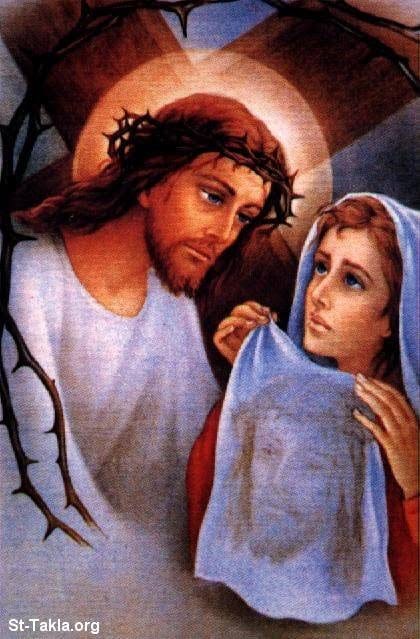
The 11th station narrates to us the nailing of Jesus to the cross. We normally tend to think or imagine that they nailed Jesus to the cross through his palms. Everywhere the crucifix was depicted in this way. But the reality invites us to understand the intensity of Jesus’ suffering on the cross. Romans normally condemns only the notorious criminals with this barbaric punishment. They nail the victims through their wrist. They used 6-7 inches long nails hammered through the wrist bones and also the veins so that the entire body weight falls on the arms. In most of the cases, arms would be dislocated from the shoulder socket due to the body weight, as a result, the person would be struggling to breathe because the entire body weight falls on the Chest ribs. The person wouldn’t be able to lift his body up and his legs would bend about forty-five degree.
If they feel pity and wanted to cut short the physical agony of the victim they used to break their legs so that they would die fast. It is said that a person can remain on the cross alive for hours and days since it is a slow death. Therefore, prior to the crucifixion, they used to flog the person with the leather belts made up of bones of the goat. In the case of Jesus this is what happened, he was brutally wounded before the crucifixion itself; as a result, they had to call Simon of Cyrene to help Jesus to carry his cross. In the end, they broke the legs of the other two men crucified with Jesus to speed up their death but they didn’t break Jesus’, because he was already dead. As usual, they confirmed his death by piercing his side.
It was not the nails that held him close to the cross but his love. A person who is the son of God, almighty, eternal… How could he suffer like this? In those intense moments of suffering, one single thought would have been sufficient for him to stop everything. Yet he accepts, forgives, prays for his persecutors and loves… Yes, Jesus, you remained on the cross because you are truly the Son of God…
The 12th station invites us to reflect on the death of God. The most significant moment in the history of the universe because this moment redeemed the entire cosmos. A question that could possibly disturb us a lot can be – How can God die? then that Being is no more a God. We may not be able to find reasonable answers for this question but there ensues only one insight – God is love. In the fullness of His love, He accepted or tasted the lifelessness that we may all have life in its fullness. We use the red rose flower as a sign of love, whereas, a crucifix speaks not about the suffering of innocent blood but the depth of his infinite love, a love that enables him to accept a reality called death. As we contemplate on these two stations we need to really reflect on the love with which we live our life. And probably ask ourselves, do we really love others or are we the products of the materialistic culture that treats people as objects and throw them away when our use of rhem is over or replaceable. Let every way of the cross that we make, be an occasion for us to renew our love in the crucified Christ, who loves us unconditionally…
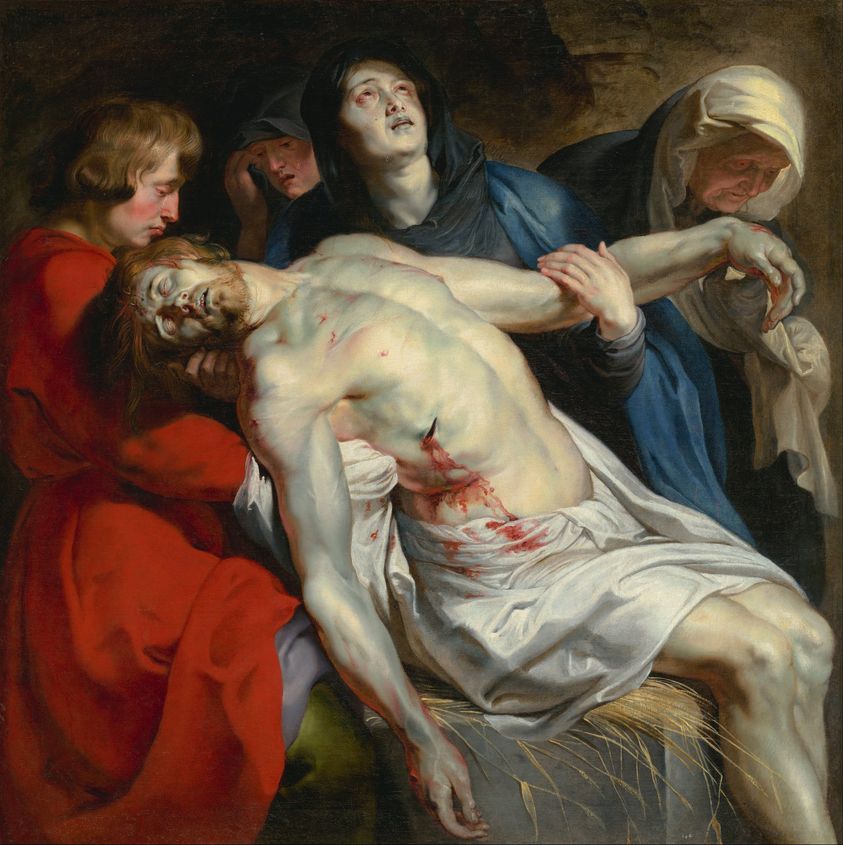
Today being the last Friday of the Lenten season as well as the Good Friday, we recall to our mind the great sacrifice of our Lord on the cross. It is indeed a graceful moment to reflect on the 13th and 14th stations on this day which invites us to enter into the last moments of the earthly sojourn of our Lord. We meditate on these stations, wherein the body of Jesus is taken down from the cross and the burial.
The 13th station leads us to reflect on the depth of maternal love of mother Mary for Jesus. She carries the lifeless body of Jesus in her arms. Mary was there at the foot of the cross. The greatest blessing of Jesus was a woman like Mary, who carried him in her womb, even risking her own life and also the shame of unknown pregnancy. Now, she is there to carry the lifeless body of Jesus on her lap. She became the first tabernacle who carried the word made flesh and now she becomes the first altar who carries the broken body of Christ. No one can support us like mother Mary in our way of the cross. We could count her on our side always. Jesus was quite sure that the woman who accompanied him without fail would also do the same in the lives of his disciples. So He gives his own mother as the mother of entire humanity. We cannot trace a saint in the church who did not hold on to the mantle of mother Mary. She will be there to carry us on her lap when we are exhausted or our path seems to be vague or cloudy…
On the 14th station, we contemplate the burial of Jesus. In fact, Jesus did not have a proper place to be born, he was born in a manger, at the end, he did not have his own tomb, and he was buried in a borrowed tomb. Then the self-emptying of Son of God has completed. They could not even give him a proper burial. According to the Jewish custom, they used to anoint the body with perfumes and spices; but in the case of Jesus there was no much time left before the Sabbath so they had to do it in a hurry.
In the end, everything seemed to be a great tragedy. He called himself as a saviour, now he ended up on the cross, couldn’t save himself, All his disciples who promised him that they would be with him abandoned him; one betrayed, another denied and the rest ran for their lives. Taking into consideration all these factors, we could conclude that his mission was a great failiure, whatever he preached, his dreams everything was buried in the tomb.
Dear friends apparently these two situations speak about the dead end of Jesus. The entire world thought that everything is over. But in the sight of God it was a great success. We can never comprehend God’s mind. The death of Jesus can be considered as a brutal murder the world has ever seen but God could transform this great tragedy into a great blessing for the humanity. ‘By His Bruises we are healed.’ The grain of wheat died in order to give life. The greatest mystery of hope is that where we think everything is lost, God can start again…those who crucified Jesus thought that they could seal him in the tomb. But His love was life giving and it defeated death. This unfailing love is our hope… Jesus, who is the source of our love will be there on our way of the cross and He never fails…

“From all my wounds, like from streams, mercy flows for souls, but the wound in my heart is the fountain of unfathomable mercy. From this fountain spring all graces for souls.
The flames of compassion burn me. I desire greatly to pour them out upon souls. Speak to the whole world about my mercy.” (Jesus to Faustina)
As we enter into the third day of the Holy week, let us reflect on the precious wound in His side – a heart that was pierced and tore open for each one of us…
“I will pour out a spirit of compassion and supplication on the house of David and the inhabitants of Jerusalem, so that, when they look on the one whom they have pierced, they shall mourn for him, as one mourns for an only child, and weep bitterly over him, as one weeps over a firstborn.” (Zec. 12:10)
He is dead but the sinful humanity is not yet satisfied. To make sure his death, they pierce and breaks open his heart… ‘blood and water flows…’ the action of cruelty personified, not even a single drop of blood left behind in his body. A heart filled with love and compassion, they broke open… they thought it would be the end of his story…but it was just a begining of new life…the streams of grace and mercy flows…
One who pierces his heart himself experiences the immersion in divine mercy… ‘The divine mercy touches the sinful humanity.’ We are no longer a slave to sin…evil is conquered forever…his precious blood is our ransom and merit. Whoever eats my flesh and drinks my blood live forever…by his bruises we are healed…let us look at him and be radiant…
Dear friends as the entire humanity pass through the dreadful corona pandemic; let us look at our saviour who is crucified for us. The people of Israel repented and brought to the bronze serpent and they came back to life. We the new Israel let us seek God’s mercy and pardon for all our deeds against his divine will and intercede for the entire humanity – ‘for the sake of his sorrowful passion that God have mercy on us and the whole world…’

Remember My Passion, and if you do not believe My words, at least believe My wounds. (Jesus to St. Faustina) As we enter into the second day of the Holy Week, let us reflect on Jesus’ wounds on his feet that we’re nailed to the cross…
The feet that touched and sanctified the earth are kept above the other and sharpened nails piercing the tissues and veins…the blood flows as a tiny stream through the nails and falls on to the ground. He took every step to teach and act on God’s love. Now the sinful humanity nailed those feet to the cross and asking him to come out of the cross and prove himself that He is the Son of God…
There is not even a single space on his body without wounds, he bleeds as the paschal lamb, he undergoes not only the physical agony but also the mental agony, the clouds of darkness covers him… do I become the symbol of human sin? Am I abandoned by Abba?, “My God, My God why have you forsaken me?” His cries break open the heaven…He accomplished the baptism that he foretold, the baptism of the Holy Spirit and the fire…”You are my beloved Son in whom I am well pleased…” In to your hands, I commend my Spirit…
Let us surrender to the holy wounds of Jesus all those who are suffering due to corona pandemic that they may experience the divine mercy…

Jesus told St. Faustina Kowalska, the apostle of Divine Mercy: “When it seems to you that your suffering exceeds your strength, contemplate my wounds.” Dear friends as the entire world suffer due to the corona pandemic, let us raise our hands in prayer, reflecting on the five wounds of Jesus that we may be strengthened to endure it with courage and hope.
“By his bruises, we are healed…”(Is.53:5) God created us in his image and likeness. It resembles our will to choose God above all and live a life of communion with Him. God fashioned our body and breathed His Spirit into us thus every person is considered as the temple of the Holy Spirit engraved in us a divine end to be with our Creator for all eternity. We are called to glorify the Holy Trinity, the perfect union of love, through our bodily being.
However, the arrival of sin to human history fractured the divine-human communion. The misuse of human free will and selfish love gashed the divine plan of eternity for human beings. The effects of sins outstripped human beings from God. He constantly reminded us to turn back to Him and claim our divine filiation. However, humanity could not get back to God because the damage caused by sins remained as an incurable wound and evil power dredged this wound. Human beings couldn’t wish his/her Creator. However, “God so loved the world, that He gave his only Son, so that everyone who believes in him may not perish may have eternal life.” (Jn.3:16) All of us are born to live anyhow, the Son of God was born into our midst to die for ourselves so that “we may have life and have it abundantly.” (Jn.10:10)
The book of Genesis explains to us the grumbling of the people if Israel against God that he punished them with poisonous serpents, they bit the people and many Israelites lost their lives. Moses interceded and God felt compassion for them. He asked Moses to make a poisonous serpent and lift it so that all those who looked at this bronze serpent would live. This event was a prefiguration of the paschal mystery of Christ. Whenever the wounded humanity looks at the Christ crucified, through his merits we receive the divine healing and transforming us as meritorious to enter into communion with God. Today let us reflect on the wound on his hands that were nailed to the cross.
The hands that were nailed
The hand that blessed, touched, comforted and healed many is now nailed to the cross. The excruciating pain of the sharpened nail piercing the tender flesh of human hands is beyond words. Added to this the pain caused by wounds that are already there by chastisement, crowning with thorns, his constant falls, etc… again this merciless cruelty, extending his hands beyond its capacity to ensure maximum pain. The hands that blessed, healed, and comforted is not cursing anyone but making everything new – he forgives all those who are persecuting him, interceding to Father on their behalf, comforting the good thief and promising him eternity… today you will be with me in paradise…

Jesus Said: “Into your hands, I commend my spirit.” We read a moving verse in Psalm 23:4 “Even though I walk through the darkest valley, I fear no evil for you are with me.”When we reflect on the crucifixion of Jesus, a question that maylinger in our mind is that, did Jesusdie in despair? In all likelihood we tend to think thatJesus died on the cross without any hope. He came to save his people but unfortunately, he was rejected by them and finally they crucified him. He worked miracles one after another for them. He raised the dead, cured various kinds of illness, multiplied bread, and gave them new law based on love. Yet he was brutally punished and executed by the Jewish leaders and his own people. They challenged him by saying that ifhe is the son of God, come downfrom the cross and save himself. All considered him as a great failure.People asked Barabbas, a notorious criminal instead of him and pleaded to Pilate for his crucifixion. Who can bear all these mental and physical torture, other than God Himself?
Sometimes we will be very much attracted by the discount offers that we see in the advertisement or free vouchers of various companies. In reality, nothing is freely given;even the salivation. It is true that we did not pay a single pie to enjoy this gratuitous gift.Instead, Son of God paid a price for it by accepting the death on the cross. How can God die? Isn’t it contradicting to His nature? It is not easy to reason out this mystery. But there is only one answer for this: “For God so loved the world that he gave his only Son, so that everyone who believes in him may not perish but may have eternal life.”(Jn3: 16)
When we reflect on these last seven words of Jesus it is clear that Jesus did not die in despair but he died in hope and he became a symbol of hope for us. It was quite sure that his Father will not allow his body to decay and Jesus very well knew this prophecy would be fulfilled in time. “You will not abandon me to the realm of the dead, nor will you let your faithful one see decay.” (Ps 16:10) In this filial trust and immense love Jesus prays the Psalm 31: 5“Into your hands, I commit my spirit; you have redeemed me, O Lord, Faithful God.”
As we conclude this reflections on the last seven words of Jesus, let us live in hope that we are not alone in this way of the cross, he has gone before us and now he accompanies us, whenever we fall and stumble, he is there to carry our cross and he understands us because he had undergone all the possible mental and physical torments even beyond our imagination. Like Jesus let us find meaning for our life by accepting our daily crosses with LOVE.

Jesus Said: “It is finished.” What did he mean? The garden of Gethsemane to Golgotha, more than fifteen hours of intense suffering came to an end on the cross. His sufferings were not that so silly. If we analyze those last fifteen hours of Jesus, we could very well understand the depth of his intense suffering. Let us begin from the Last Supper: Judas betrayed him with a kiss. He underwent intense mental agony in the garden of Gethsemane. Peter, the leader of his apostles, who promised staunch fidelity to the Master, denied him thrice. All the other disciples ran for their life. Added to that the false accusation of the high priest, Pharisees, and his own people. The mockery of the soldiers like slapping and spitting on his face, crowning him with thorns. They made him wear a long gown, fooled him as though he was a king and chastised him on the journey to Calvary; thrice he fell down on the way. His hands and legs were nailed to the cross. And also the harassment of the people, soldiers, fellow prisoners etc.
He did not mean that his intense sufferings were over rather it was the peak moment of his mission wherein he gained salvation for mankind by offering his life as a sacrifice on the cross. From this content heart, Jesus said that all that his Abba revealed to humanity about the Messiah was fulfilled. The disobedience of Adam brought death to humanity but the obedience of Christ to God’s will brought back eternal life to humanity. We read in the book of prophet Isaiah: “By his bruises, we are healed.”(Isa 53:5) Thus the suffering that he endured transformed his body as the bread of life and the blood that he shed became the life-giving water.
Jesus did not want to escape from his suffering. He accepted it wholeheartedly because he found great meaning in his suffering. He transformed his suffering as redemptive. We have seen a number of saints who accepted the suffering wholeheartedly. They recognized the mystery of the cross and surrendered their lives along with the sufferings of Jesus. St. Paul in his letter to the Corinthians gives the account of sufferings that he had to undergo in order to be a witness of Christ (2Cor11: 24-27). He was not ready to give up his faith because of his sufferings or difficulties. In the end, he asks: who can separate us from the love of Christ?( Rom 8:35) in the same way, we read in the life of St. Alphonsa, even in the midst of intense suffering when others enquired about her wellbeing, she replied that she was loving.
What is our response towards the suffering that we encounter in our life journey? Do we find meaning in our suffering? Like Jesus let us accept our difficulties wholeheartedly. I agree with you it is not easy to accept suffering when it causes intense pain and uneasiness. Let us hang on to that man on the cross, definitely, he will empower us to accept our difficulties and transform them into redemptive power. At the end of our life’s Journey with a contended heart let us say: “It is finished.”

Jesus said: “I thirst.” It is quite natural that a person who is encountering death very closely feels thirsty. What about Jesus’ thirst on the cross? Was it merely a thirst for a few drops of wine?
It is undesirable to imagine the mental state of a person who undergoes the punishment of crucifixion. It is considered as the most agonizing form of execution. This barbarous punishment was rewarded only for those notorious criminals of the ancient time. Roman citizens were exempted from this punishment because it was considered as below their dignity. The victim would experience each excruciating moment of his death. Normally, victims used to die by cursing themselves and others. However, Jesus found great meaning for each and every moment of his passion especially on the cross because he knew that his sacrifice would transform everything.
It was considered as a basic human right to allow a person to die with dignity. Therefore, soldiers gave bitter vine for Jesus. It was a kind of sedation so that the victim might not realize the unbearable pain of crucifixion and die pain-free. Jesus tasted the vine but he did not drink the bitter vine. John, the beloved disciple who was a witness for this event says that it happened in order to fulfill the scripture. The thirst that Jesus felt was not a biological need rather it was a spiritual quest for souls, which last till the end of time. That was His mission, salvation of souls. He brought back the corrupted humanity into the bosom of his Father. Even today, he continues the same mission. It is his sacrifice on the cross that saved us. Can we become collaborators in his mission?
There are holy men and women who shared the same thirst for souls that Jesus had. I remember an incident read from the autobiography of St. Therese of Child Jesus. She read about a man who was a notorious criminal and being sentenced to the death penalty. She prayed hard for his conversion but he was not ready to repent, the prison chaplain tried his best but he refused to change his mind. All the same, she prayed with great hope. Interestingly, on the way to execution room, he was deeply touched by the divine mercy and begged pardon from the Lord, for all his failures and the chaplain commented his soul to the boundless mercy of Christ. Thus he became the first spiritual Son of Therese. As we reflect these words of Jesus let us imbibe the same thirst that Jesus had for the souls and let us add a new story of winning souls for Jesus.

Jesus cried: “My God, My God why have you forsaken me?” This heartfelt cry of Jesus always disturbed me. Did he experience the abandonment of His Abba at that crucial juncture?
I got little light about this dark night of Jesus when I read a book titled: “Come be my light.” It is a collection of the private letters of Mother Theresa that she had written to her spiritual director. She expresses her mental agony in these words: “Such deep longing for God — and … repulsed — empty — no faith — no love — no zeal. Saving souls hold no attraction — Heaven means nothing — pray for me please that I keep smiling at Him in spite of everything.” A woman who was considered as the ambassador of Christ’s charity was deprived of his charity! When she started her work, she heard Christ’s voice in her innermost being but then the rest of the forty years of her life she was deprived of his presence. Though her work was flourished all over the world, well appreciated, and even she won the Nobel Prize for peace in 1979. Yet she experienced great spiritual dryness within her. She felt a kind of abandonment similar to Christ that he had on the cross. It is considered as a mystical experience. The spiritual authors would say it is the privilege of the chosen soul who is called to partake in the passion and suffering of Christ in a mystical way. The soul would undergo severe mental agony because he/she deprived of the presence of God. But in reality, that soul will be closer to God and grows deeper in his/her relation with God. However, that soul may not recognize his/her spiritual growth, they feel that they are abandoned and experience severe mental agony. It is beyond our reasons to understand. Isn’t it? What about Jesus’ experience on the cross?
At times we may think that Jesus died in despair. It is true Jesus felt the silence of His Father. It was more than a cry of disappointment. it was a sincere prayer from Jesus. Like every Jew, in that intense moment of pain and suffering Jesus prayed Psalm 22: “My God, My God why have you forsaken me?” If we read the whole psalm we will be enlightened to understand the meaning of Jesus’ prayer on the cross. This psalm was a prophecy of King David about the suffering of Jesus. This psalm concludes with the fruits of salvation that Jesus brings forth through his, passion death and resurrection. What is the message that we need to take home?
In our sojourn, we too face disappointment or feel that we are abandoned by God. But remember Jesus was tested like any of us but always defended himself with his immense trust in Abba. We read in the scripture that all those difficult moments, He prayed the word of God that united him with the Father and it empowered him to carry his cross and finally to attain His victory over death. Let us pray like Jesus…

“Beneath the cross one learns to love.”(St. Padre Pio) The image of Mary carrying the lifeless body of Jesus in her arms always captures our attention. We cannot leave this picture without nostalgia of our own mothers. It is through our mother’s arms that we might have experienced the tender loving care of a person for the first time in our life. What would have been the thoughts of mother Mary when she carried the lifeless body of her Son?
Calvary invites us to meditate on this moving love story between Mary and Jesus; a love story between God and a human person. The Son knew his mother from eternity and she became His perfect disciple and spiritual daughter. Mary was an ordinary Jewish woman who loved her son unconditionally. She conceived her Son not out of a natural marital relationship, which is considered as a great offence and as per Jewish tradition, such a woman, could be stoned to death. She knew very well that her Son was someone special but His birth and death seemed to be very tragic. How can this happen to her son who was considered as the promised Messiah of Israel?
Yet she was not ready to give up on her son. She always listened to Him and accompanied Him even to Calvary without any fail. Jesus too had a filial love towards His mother. He stayed with her thirty years at home. He had a caring heart for her. Even in the midst of His hectic schedules, He managed to find time to visit her. Finally, on the Calvary, even when he was fighting with death He wanted to entrust His mother to His beloved disciple. Was it so? Then why did Jesus entrust John to Mary?
On Calvary, Jesus raised her motherhood to a universal realm. Jesus became the Second Adam and Mary became the mother of all those who are saved by her Son’s precious blood, The New Eve. She accompanies us in our life journey just like she accompanied Jesus on His way to Calvary. Like John let us take her home and she will accompany us on our earthly sojourn and journey back to our eternal home.

Jesus said: “Truly I say to you, today you will be with me in paradise.”(Lk 23: 43) In our meditation on the way of the cross, the good thief remains as a hero. When we run through the history we come across a few thieves who were the real heroes of their time. Our good thief may be the first hero of that category. The spiritual writers used to say; at the end of his life journey he stole paradise from Jesus and thus the loser became the hero. But how could a thief be the hero? Isn’t it unnatural?
It is Jesus’ compassion that transformed this man who was labeled as a criminal to a hero. Even in the midst of his intense suffering, Jesus extended his compassionate heart to the good thief. When we reflect on the conversation between Jesus and the good thief, we can be sure that he might have heard about Jesus earlier otherwise he would not have acknowledged the innocence of Jesus. This good thief resembles many of us; sometimes though we know the truth, yet we postpone our conversion or remain indifferent towards the truth. But the greatness of the good thief is that on the cross, he embraced this truth and prays a sincere prayer: “remember me in your kingdom.” He acknowledged Christ as his king and savior. However, the other thief, even at the last moment, chose to be indifferent towards the truth that Jesus is. He challenged Jesus to work miracles by saving himself and also both of them. Many of our brethren like this thief question the authenticity of the person of Jesus and not ready to embrace this eternal truth. Then, what about the kingdom mentioned by this man?
All those who gathered there thought that Jesus would fight against Roman Empire and establish David’s throne. But this good thief received the wisdom to understand that what Jesus meant was not a kingdom bound by space and time of this earth rather it is the eternity. At the end, Jesus gives a share of his eternity to this good thief. “You will be with me in paradise.” Jesus is the eternity, the Eternal Truth; thus, the loser became the hero. Let us give witness to this eternal truth by carrying our daily crosses without complaints and become his heroes.

Jesus Said: “Father, forgive them for they do not know what they are doing.”(Lk 23: 24) Jesus extended an unconditional forgiveness to all those who caused his misery on the cross. At the very outset, we may think it is only the Roman soldiers those who persecuted him are responsible for his crucifixion on the cross but all of us who made him a Pascal Lamb are responsible for his death. But In Jesus, we all are forgiven. But do we practice the same forgiveness that we have received from Jesus?
In our day to day life, we find it very difficult to forget and forgive the failures of our brethren. It is true that it is not that easy to practice the virtue of forgiveness, especially in our concrete life situations. We are living in a world wherein, people suffer because of the grudge feeling that they keep with them. Our contemporary world is in need of reconciliation between individuals, families, societies, states, and countries. How is it possible for us?
“To err is human; to forgive, divine.”(Alexander Pope) When we analyze the history we can find individuals who imitated the unconditional forgiveness of Jesus towards their persecutors like St. Maria Goretti, St. John Paul II, Bl. Rani Maria. The only solution for us is Jesus, who extended an unconditional forgiveness towards His persecutors. Let us embrace Jesus, the man on the cross, to receive His grace that we too may extend an unconditional forgiveness towards our fellow brethren. We need to keep in mind that we are forgiven unconditionally because of the innocent blood that He shed on Calvary. Let us forget and forgive the failures of our fellow brethren by hanging on to that man on the cross and become divine while we are alive…

